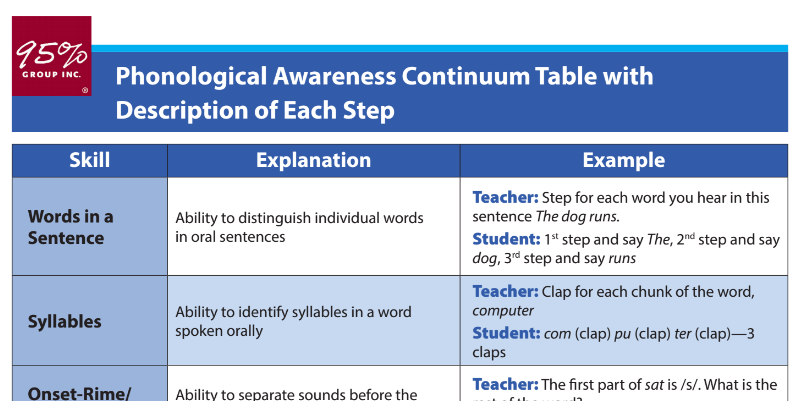The Definition of Phonological Awareness

Over the past 20 years phonological awareness has become one of the most significant topics in early reading. As a result, teachers are better informed about the importance of ensuring that students are aware of the sounds in words. Instructional practices have significantly changed because of the extensive amount of research focused on this issue. This post aims to give you a brief overview.
Phoneme awareness performance is a strong predictor of long-term reading and spelling success and can predict literacy performance more accurately than variables such as intelligence, vocabulary knowledge, and socioeconomic status.
Gail T. Gillon
Phonological awareness defined
Phonological Awareness (PA) is the foundation upon which the other reading skills are built. Simply stated, the definition of phonological awareness is “the ability to notice the sound structure in words” (Kilpatrick, 2015). When students don’t master PA, it can adversely affect their progress in the other essential reading components.
A strong phonological awareness foundation is built by mastering a sequence of skills from simple to complex. Small-group instruction, when delivered explicitly, addresses the missing skills for at-risk students.

Teaching Phonological Awareness Skills
Phonological awareness skills fall into three main areas: syllable, onset-rime, and phoneme. Additionally there are many different subskills within each of these three areas. The 95 Percent Group Phonological Awareness Continuum Table outlines 10 different types of PA instruction for building critical skills. Effective phonological awareness lessons provide instruction that is structured and sequential.
Teachers often ask us if there is a recommended order for instruction. Research indicates that especially for students who struggle, lessons aligned with the developmental approach that awareness of larger units (syllables and onset-rimes) develops before awareness of smaller units (phonemes) is optimal.
As you can see in the image, phonemic awareness is a subset of phonological awareness, and is the last skill mastered. In English there are three main phonological levels:
- Syllables
- Onset-rime, or rhyming
- Phonemes
Phonological awareness involves the ability to think about all three levels of our language.
Why is explicitly teaching Phonological Awareness so important?
Teaching phonological awareness is critical for the following reasons:
- Phonological awareness is the necessary foundation upon which phonics is built.
- Lack of success in phonological awareness affects future progress in the other components of reading.
- To learn phonics and other word reading skills, an adequate level of phonemic awareness must be reached.
- Lack of phonological awareness causes struggling readers in higher grades to lack accuracy and fluency in decoding and spelling words.
Additional phonological awareness resources
We’d love for you to go further with this and explore our table detailing the 10 different types of Phonological instruction here.



